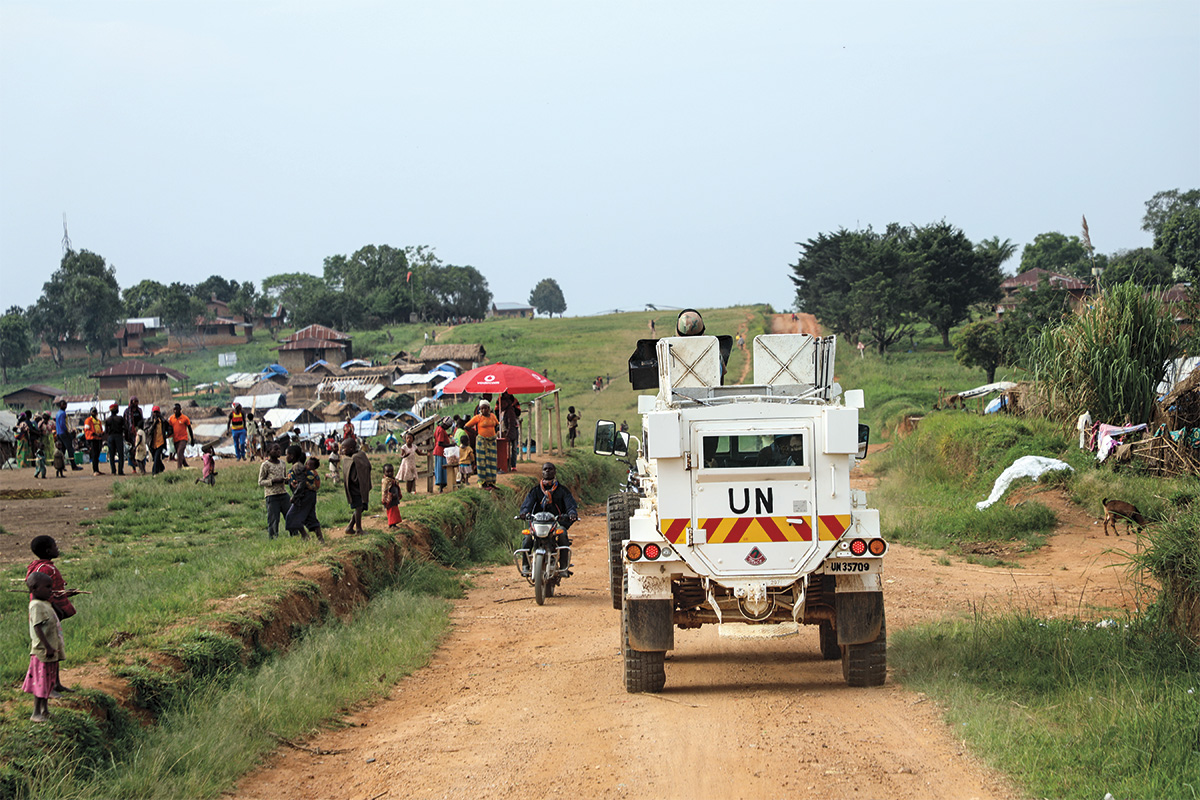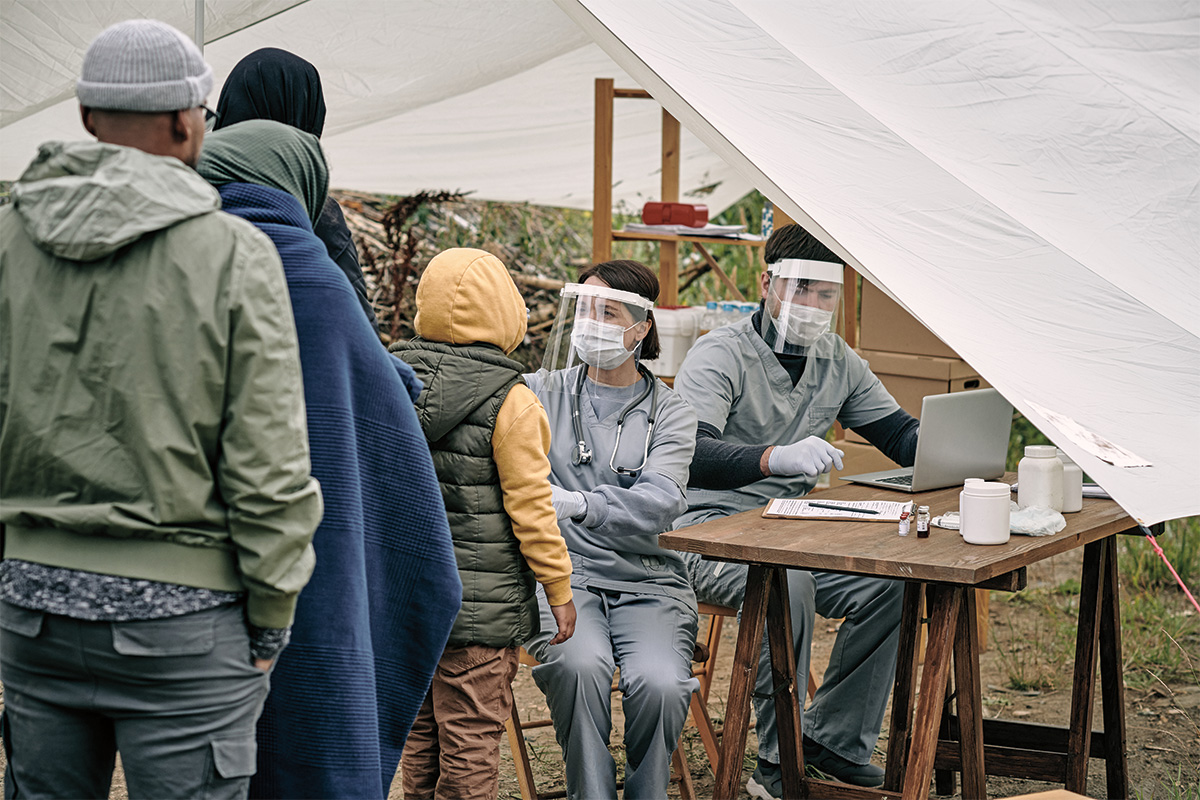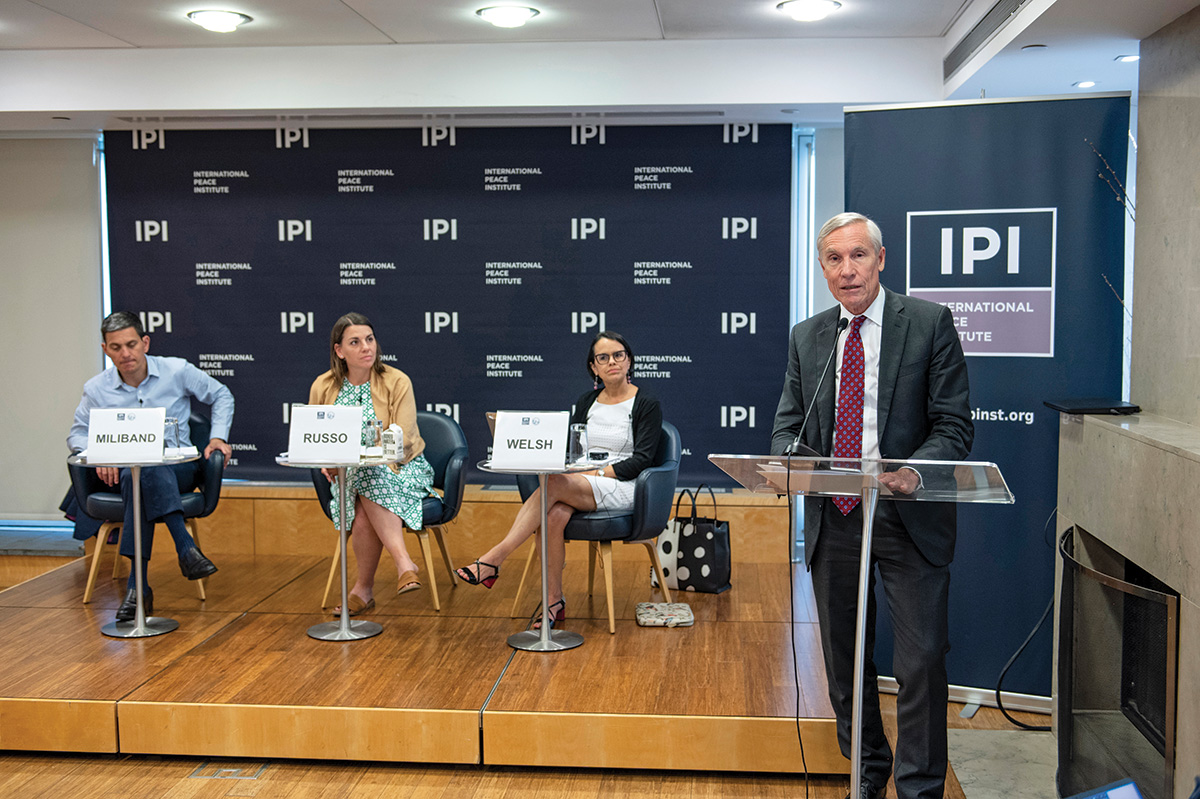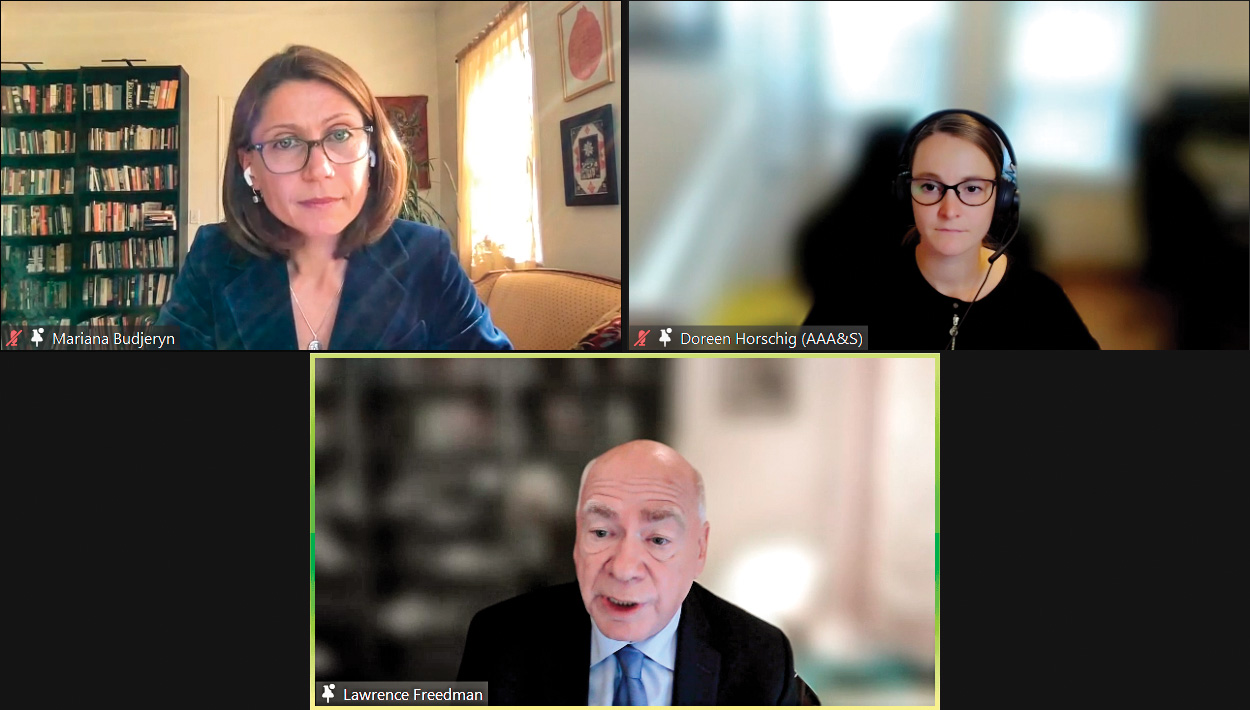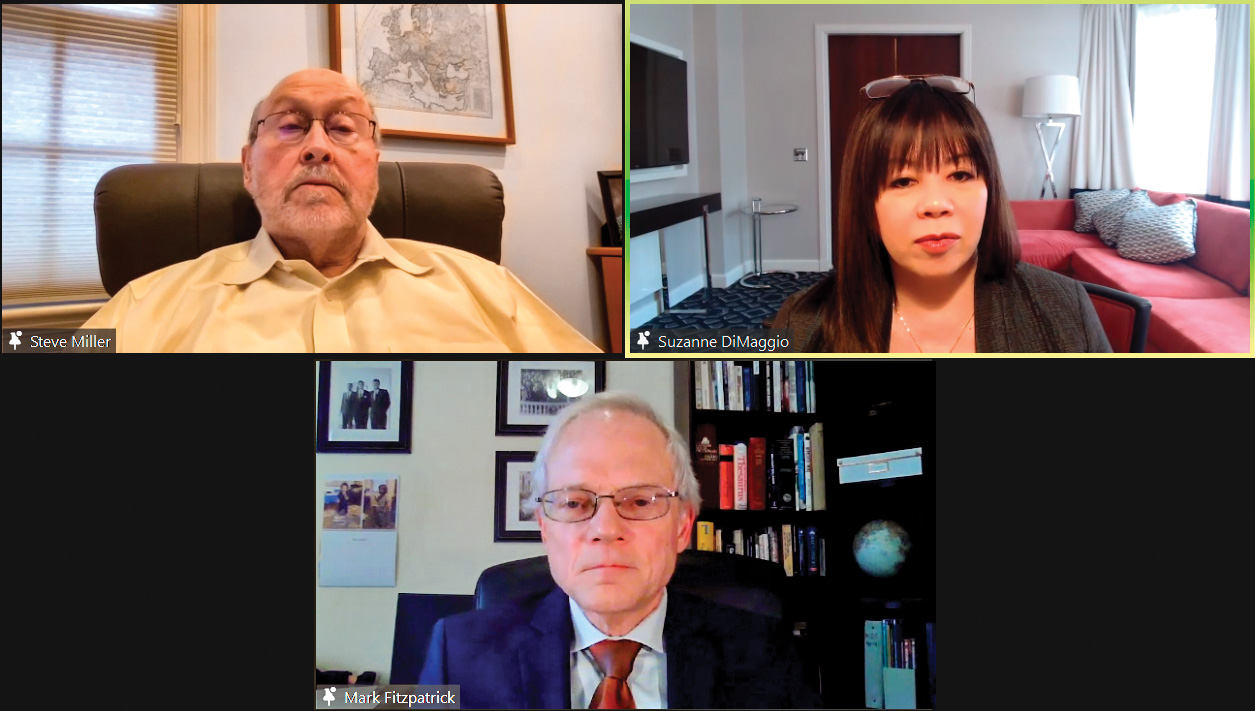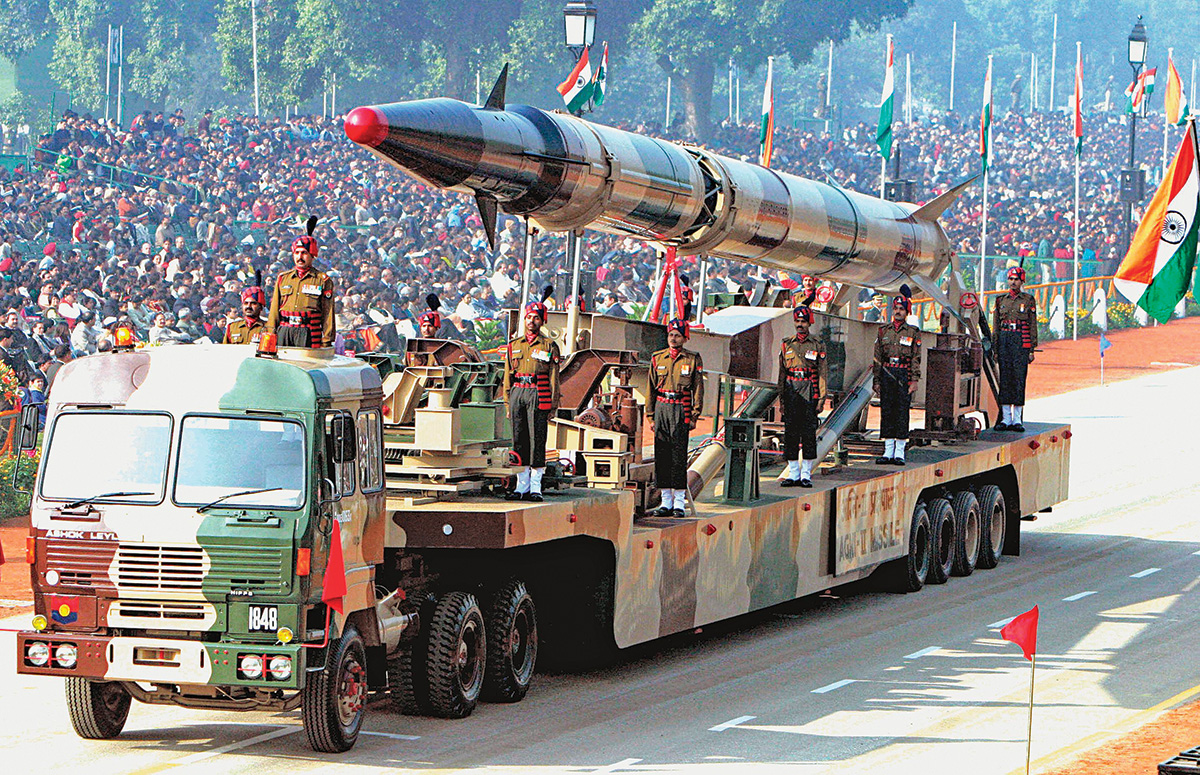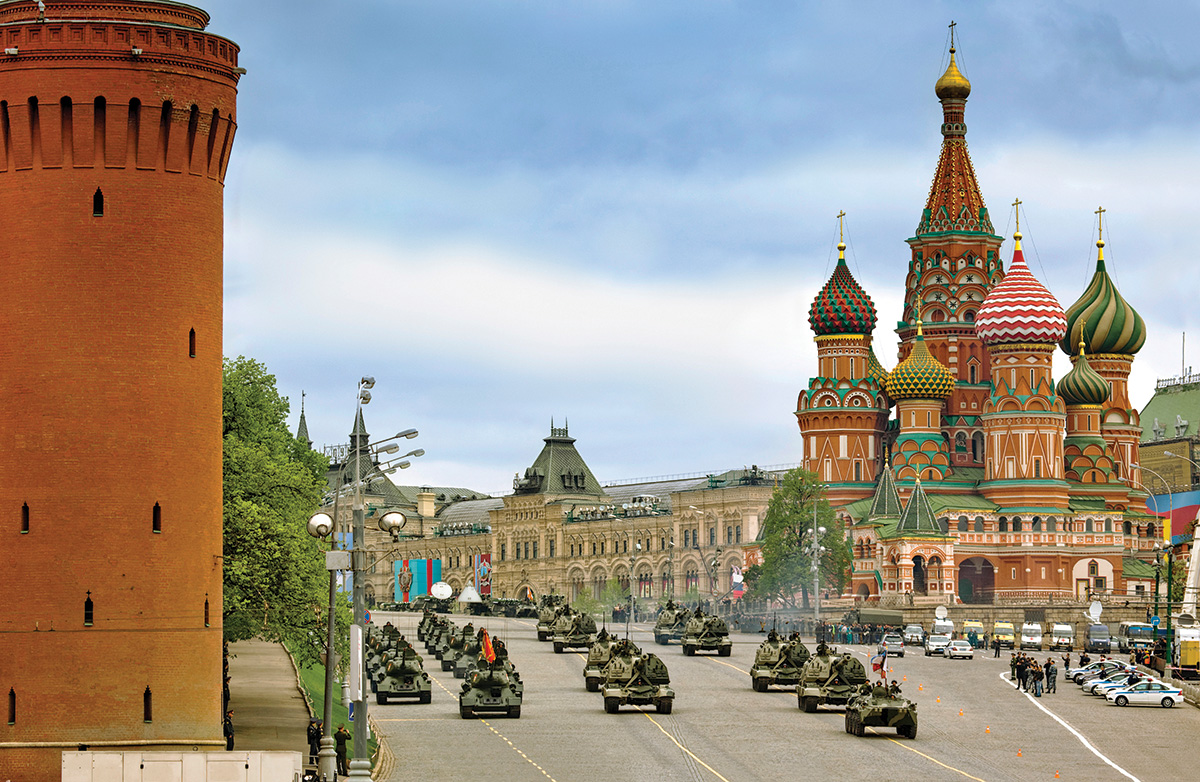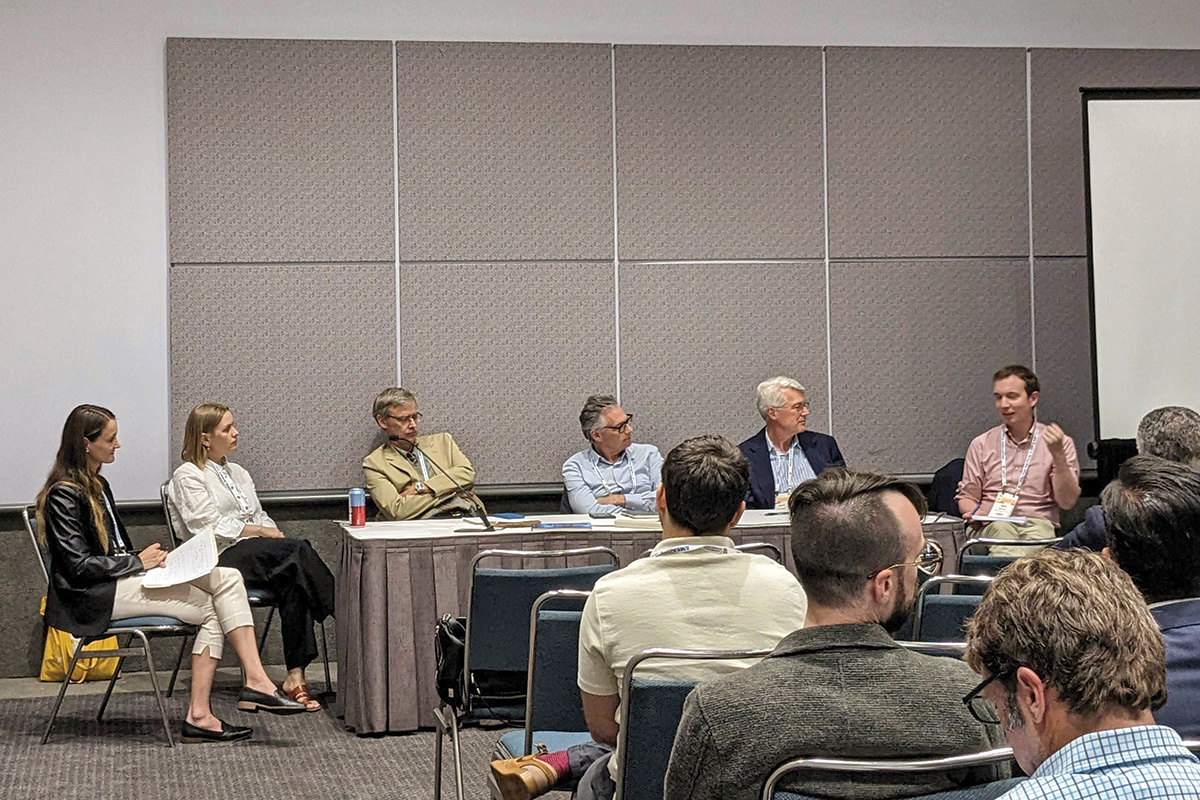The Global Security and International Affairs program area draws on the expertise of a broad range of policymakers, practitioners, and scholars to foster knowledge and promote innovative and evidence-based policies to address crucial issues affecting the international community. Projects underway in this area engage with pressing strategic, development, and moral questions that underpin relations among people, communities, and states worldwide. Each initiative embraces a broad conception of security as the interaction among human, national, and global security imperatives. Project recommendations move beyond the idea of security as the absence of war toward higher aspirations of collective peace, development, and justice at all levels of society.
Committee on International Security Studies
Chair
Scott D. Sagan
Stanford University
Members
Antonia Chayes
Tufts University
Christopher F. Chyba
Princeton University
Neta C. Crawford
University of Oxford
Karl W. Eikenberry
Schwarzman College
Tanisha M. Fazal
University of Minnesota
Martha Finnemore
George Washington University
Lawrence D. Freedman
King’s College London
Susan Landau
Tufts University
Robert Legvold
Columbia University
Rose M. McDermott
Brown University
Steven E. Miller
Harvard Kennedy School
Barry R. Posen
Massachusetts Institute of Technology
Adam Roberts
British Academy
Jennifer M. Welsh
McGill University
Paul H. Wise
Stanford University
Project
Rethinking the Humanitarian Health Response to Violent Conflict
The Rethinking the Humanitarian Health Response to Violent Conflict project seeks to understand and address current trends in humanitarian contexts that pose new or evolving challenges for humanitarian health responders. Among the most pressing challenges are the increasingly protracted nature of civil and non-international armed conflict; the fact that many of the world’s most violent places are facing criminal or political violence rather than conflict as conventionally understood; shortfalls in funding; and changing geopolitical relations. This project brings together political scientists, legal and security experts, health professionals, and humanitarians to examine current challenges to effective humanitarian action and to develop, where necessary, new strategies for preventing civilian harm and delivering critical health services in areas plagued by violent conflict.
Current work includes a focus on responding to some of the urgent challenges posed by the COVID-19 pandemic’s effects on humanitarian health needs in conflict areas and other violent settings. Building on its efforts to address the political and security dimensions of pandemic response in areas of weak governance and violent conflict, the initiative published two research papers as part of a workstream on global cooperation and pandemic control.
Another area of work, exploring Regional Humanitarian Responses to Pandemics, Criminal and Political Violence, and Forced Migration, is publishing a series of peer-reviewed journal articles that present the findings of field research conducted in partnership with the University of California, San Diego, and El Colegio de la Frontera Norte. This work focuses on understanding the impacts of COVID-19 on migrants at the U.S.-Mexico border.
A Dædalus volume, published in May 2023, synthesizes these findings from across all components of the project, with tailored resources prepared for select audiences, including policymakers and practitioners. The Academy organized a series of launch events in 2023 to discuss key findings in the volume. These events engaged experts in London, New York City, and Mexico City.
Project Chairs
Jaime Sepúlveda
University of California, San Francisco
Jennifer M. Welsh
McGill University
Paul H. Wise
Stanford University
Advisory Group
Sergio Aguayo
El Colegio de México
Donald M. Berwick
Institute of Healthcare Improvement
Louise Henry Bryson
Public Media Group of Southern California
Rita Dayoub
Chatham House
Elisabeth Decrey Warner
Geneva Call
David P. Fidler
Council on Foreign Relations
Fouad M. Fouad
American University of Beirut
Marion Jacobs
University of Cape Town
Arthur Kleinman
Harvard University
Joanne Liu
McGill University
Li Lu
Himalaya Capital Management LLC
Jane Olson
Human Rights Watch
Deborah F. Rutter
John F. Kennedy Center for the Performing Arts
Tamara Taraciuk Broner
Human Rights Watch
Project Staff
Melissa Chan
Program Coordinator for Global Security and International Affairs
Michelle Poulin
Program Associate for Global Security and International Affairs
Peter Robinson
Interim Chief Program Officer and Morton L. Mandel Director of Strategic Implementation
Jumaina Siddiqui
Program Director for Global Security and International Affairs
Funders
Louise Henry Bryson and John E. Bryson
Malcolm Hewitt Wiener Foundation
The Rockefeller Foundation
Project Publications
“Delivering Humanitarian Health Services in Violent Conflicts,” Dædalus, edited by Jaime Sepúlveda, Jennifer M. Welsh & Paul H. Wise (Spring 2023)
Peace Operations at the Intersection of Health Emergencies and Violent Conflict: Lessons from the 2018–2020 DRC Ebola Crisis, Dirk Druet (American Academy of Arts and Sciences, 2022)
International Cooperation Failures in the Face of the COVID-19 Pandemic: Learning from Past Efforts to Address Common Threats, Jennifer M. Welsh (American Academy of Arts and Sciences, 2022)
Ietza Bojorquez-Chapela, Steffanie A. Strathdee, Richard S. Garfein, et al., “The Impact of the COVID-19 Pandemic Among Migrants in Shelters in Tijuana, Baja California, Mexico,” BMJ Global Health (2022)
Ietza Bojorquez, Jaime Sepúlveda, Deandra Lee, and Steffanie Strathdee, “Interrupted Transit and Common Mental Disorders among Migrants in Tijuana, Mexico,” International Journal of Social Psychiatry (2022).
Antoine Chaillon, Ietza Bojorquez, Jaime Sepúlveda, et al., “Cocirculation and Replacement of SARS-CoV-2 Variants in Crowded Settings and Marginalized Populations along the US-Mexico Border,” Salud publica de Mexico (2022).
Project Meetings
Health Emergencies and the Humanitarian Sector: Lessons for Sustaining Peace in a Pandemic
November 1, 2022
Organized by the International Peace Institute, Geneva Centre for Security Policy, and the Geneva Peacebuilding Platform, Dirk Druet, author of the Academy’s report, Peace Operations at the Intersection of Health Emergencies and Violent Conflict: Lessons from the 2018–2020 DRC Ebola Crisis, participated in a roundtable discussion during Geneva Peace Week. Druet shared lessons learned from pandemic responses by health, humanitarian, and peacebuilding sectors, such as the 2018–2020 Ebola crisis in the Democratic Republic of the Congo.
Governance and Financing for International Cooperation on Pandemic Preparedness
December 6, 2022
In partnership with the Center for Global Development (CGD), the Academy organized a virtual meeting that focused on strengthening global cooperation for pandemic preparedness. The event reviewed the current state of financing for pandemic preparedness, pandemic treaty negotiations with the World Health Assemblies, and the role of multilateral collaboration in driving an agenda to reform the global health architecture. The event drew on CGD’s global health security work and the Academy’s report, International Cooperation Failures in the Face of the COVID-19 Pandemic: Learning from Past Efforts to Address Common Threats, by Jennifer M. Welsh.
21st Century Challenges and Opportunities for Humanitarian Health Responses
New York, NY
July 20, 2023
Organized in partnership with the International Peace Institute, this event in New York City served as the U.S. launch for the project’s Dædalus volume. The speakers focused on several themes highlighted in the volume: the current landscape for humanitarian action, high level and local level health service delivery, on the ground perspectives, and the health-development nexus.
Speakers
Dirk Druet
International Peace Institute; McGill University
Fouad M. Fouad
American University of Beirut; Global Health Institute
David Miliband
International Rescue Committee
David W. Oxtoby
American Academy of Arts and Sciences
Jenna Russo
International Peace Institute
Jennifer M. Welsh
McGill University
Paul H. Wise
Stanford University
A World in Humanitarian Crisis: Forced Mobility and Organized Crime in Latin America
Mexico City, Mexico
September 12, 2023
In partnership with El Colegio de México, the Academy held a policy forum that explored the challenges in delivering humanitarian health services to migrants in areas affected by political and criminal violence in Latin America. The discussions focused on the ambiguity of humanitarian health service delivery in situations other than war and on unpacking the drivers of forced migration due to urban violence and climate change within the region.
SPEAKERS
Sergio Aguayo
El Colegio de México
Ietza Bojórquez
El Colegio de la Frontera Norte, Mexico
Julia Carabias
National Autonomous University of Mexico
Silvia Giorguli Saucedo
El Colegio de México
Emilio González
UNHCR Protection Unit, Mexico
David W. Oxtoby
American Academy of Arts and Sciences
Jaime Sepúlveda
University of California, San Francisco
Tamara Taraciuk Broner
Inter-American Dialogue
Karine Tinat
El Colegio de México
Miguel Ángel Valverde Loya
Mexican Ministry of Foreign Affairs
Challenges to Delivering Humanitarian Health Care in Today’s Conflicts
London, United Kingdom
November 6, 2023
In collaboration with Chatham House, the Academy held an event that focused on the obstacles to effective implementation of humanitarian health services in today’s conflicts, including in Ukraine and Gaza. These obstacles include state-sanctioned use of indiscriminate biological, nuclear, and cluster incendiary weapons and the ongoing blockade and forced displacement in Gaza. The participants also discussed the geopolitical implications of such challenges to humanitarian efforts.
Project
Promoting Dialogue on Arms Control and Disarmament
Unlike the Cold War, the current nuclear age is characterized by a simultaneous collapse of arms control agreements and the absence of any strategic dialogue among the three main nuclear players. One strand of work in the Promoting Dialogue on Arms Control and Disarmament project consists of a series of Track-II dialogues between experts and former policymakers from the United States, Russia, and China, which is designed to identify critical short-term goals in arms control that would serve to minimize and reduce the potential risks of nuclear arms-racing and escalation. The meetings identify areas for cooperation and promote conceptual thinking about measures that might strengthen strategic stability and help to reduce the significant dangers of nuclear weapons being used in the future.
A second strand of work builds on the Academy’s prior experience in organizing educational sessions for the U.S. Congress on a range of topics. Through a series of engagements with members of Congress and their staffs, the project helps foster and strengthen knowledge on key issues and challenges facing the United States in arms control and international security, with particular attention to careful management of the strategic competition posed by China and Russia.
A third strand of work weaves the project’s expert discussions and policy recommendations together to produce high-impact publications on critical debates within nuclear arms control. These publications will be translated into Russian and Chinese for dissemination to policymakers and the arms control communities in Moscow and Beijing.
Project Chair
Steven E. Miller
Harvard University
Project Staff
Melissa Chan
Program Coordinator for Global Security and International Affairs
Doreen Horschig
Raymond Frankel Nuclear Security Policy Fellow
(July 18, 2022–March 29, 2023)
Michelle Poulin
Program Associate for Global Security and International Affairs
Peter Robinson
Interim Chief Program Officer and Morton L. Mandel Director of Strategic Implementation
Ottawa Sanders
Raymond Frankel Nuclear Security Policy Fellow
Jumaina Siddiqui
Program Director for Global Security and International Affairs
Funder
The Raymond Frankel Foundation
Project Publications
Missile Defense and the Strategic Relationship among the United States, Russia, and China, Tong Zhao and Dmitry Stefanovich (American Academy of Arts and Sciences, 2023)
Minimizing the Negative Effects of Advances in Military-Relevant Space Capabilities on Strategic Stability, Nancy Gallagher and Jaganath Sankaran (American Academy of Arts and Sciences, 2023)
Nuclear Perils in a New Era: Bringing Perspective to the Nuclear Choices Facing Russia and the United States, Steven E. Miller and Alexey Arbatov (American Academy of Arts and Sciences and Russian Academy of Sciences, 2021)
Project Meetings
Russia-Ukraine War: Implications for the Global Nuclear Order and Arms Control
September 29, 2022
The Academy hosted a virtual briefing for congressional staff that offered up-to-date analysis on the Russia-
Ukraine War, with a focus on the role of nuclear strategy and deterrence since the beginning of the war and its implications for nuclear arms control and nonproliferation. Chaired by the Academy’s former Raymond Frankel Nuclear Security Policy Fellow, Doreen Horschig, the panel discussion featured Lawrence Freedman (King’s College London) and Mariana Budjeryn (Harvard Kennedy School).
North Korea’s Nuclear Threats
November 16, 2022
The Academy hosted a virtual briefing for congressional staff on nuclear threats from North Korea. Overshadowed by the current war in Ukraine, North Korea’s steady progress on nuclear and missile technologies has flown under the radar of public attention. Chaired by project leader Steven E. Miller, the briefing featured Mark Fitzpatrick (International Institute for Strategic Studies) and Suzanne DiMaggio (Carnegie Endowment for International Peace), with introductions from Representative Jim Cooper (D-TN), cochair of the Congressional Nuclear Security Working Group (C-NSWG), and Representative Bill Foster (D-IL), former cochair of the C-NSWG.
The Doomsday Clock and Today’s Nuclear Landscape
Washington, D.C.
January 25, 2023
Sponsored by Senator Ed Markey and organized in partnership with the Bulletin of the Atomic Scientists and Council for a Livable World, the Academy hosted an in-person briefing in Washington, D.C., for congressional staff on the facets of today’s nuclear landscape that inspired the Bulletin in January 2023 to set its nuclear Doomsday Clock at 90 seconds to midnight. The briefing featured Scott Sagan (Stanford University), Siegfried Hecker (Stanford University), and Sharon Squassoni (George Washington University)–all members of the Bulletin’s Science and Security Board.
Iran’s Nuclear Program, Regime Protests, and Regional Stability
March 1, 2023
The Academy hosted a virtual briefing for congressional staff, sponsored by the Congressional Nuclear Security Working Group, on Iran’s nuclear program. Just a day before the event, the International Atomic Energy Agency (IAEA) confirmed that their inspectors had found traces of near weapons-grade nuclear material in Iran. The meeting, chaired by Doreen Horschig, former Raymond Frankel Nuclear Security Policy Fellow at the Academy, featured Kelsey Davenport (Arms Control Association) and remarks from Representative Chuck Fleischmann (R-TN).
Project
Meeting the Challenges of the New Nuclear Age, Phase I
The world has entered a new nuclear era. No longer dominated by two nuclear superpowers, the evolving multipolar nuclear order presents fundamental challenges to the conceptual and practical means of avoiding nuclear war. Moreover, the new era has slowly dismantled the bilateral arms control framework, with no clear prospect that it will be revived and extended. The possibility that a framework or frameworks encompassing other, let alone all, nuclear powers can be achieved seems even more remote. In addition, advances in weapons technology and the opening of new frontiers, such as cyber capabilities and artificial intelligence, make a shifting environment still more complex. The pathways to inadvertent nuclear war have multiplied across more regions and relationships.
Since 2017, the Meeting the Challenges of the New Nuclear Age project has worked to identify the major dangers generated by the dynamics of a multipolar nuclear world that pose the greatest threat of inadvertent nuclear war; offer alternative approaches to addressing each of these dangers; facilitate discussions with relevant communities in the United States and abroad; and encourage and assist policymakers, Congress, the analytical community, and the media to think systematically about our increasingly multipolar world. The publications produced by the project have been shared widely with domestic and international policymakers, scholars and students of nuclear affairs, and leaders of international organizations.
The Meeting the Challenges of the New Nuclear Age project is rooted in the critically important work on arms control that the Academy conducted from 1958 to 1960 to prevent a nuclear confrontation between the United States and the Soviet Union. During that time, Academy Fellows gathered monthly to build a cooperative framework between the United States and the Soviet Union based on the limitations of the nuclear stockpile and the establishment of mutual vulnerability between the two rivals. The group included Donald Brennan, Edward Teller, Henry Kissinger, and Thomas Schelling, among others. Today, more than ever, an effort that brings together scholars and policymakers to examine the wide range of challenges posed by the changing nuclear order is urgently needed.
Project
Meeting the Challenges of the New Nuclear Age, Phase II: Deterrence & New Nuclear States
With the emergence of three new nuclear powers (India, Pakistan, and North Korea) and several rising nuclear powers (including Iran, Saudi Arabia, and Turkey), the world is on the verge of a new nuclear age. This will demand new thinking about the security implications of nuclear powers that may be in highly hostile environments, suffer from domestic instability, have fewer resources, or be led by personalist dictators. Building and expanding upon the work in Phase One, the second phase of the project investigates the deterrence and defense implications facing small nuclear force countries and potential proliferators.
The project produced an edited volume of essays, The Fragile Balance of Terror: Deterrence in the New Nuclear Age, published by Cornell University Press. Outreach activities are being directed to nuclear and arms control policy-makers (primarily in the United States) and academic centers and think tanks with a focus on nuclear studies.
Project Chairs, Phase I
Christopher Chyba
Princeton University
Robert Legvold
Columbia University
Project Chairs, Phase II
Vipin Narang
U.S. Department of Defense; Massachusetts Institute of Technology
Scott D. Sagan
Stanford University
Steering Committee Members, Phase I
Thomas J. Christensen
Princeton University
Lynn Eden
Stanford University
Steven E. Miller
Harvard University
Janne Nolan †
George Washington University
Scott D. Sagan
Stanford University
Jon Wolfsthal
Nuclear Crisis Group
Working Group Members, Phase I
James M. Acton
Carnegie Endowment for International Peace
Mark Bell
University of Minnesota
Linton Brooks
Center for Strategic and International Studies
M. Taylor Fravel
Massachusetts Institute of Technology
Francis J. Gavin
Johns Hopkins School of Advanced and International Studies
Michael Krepon †
Stimson Center
Hans Kristensen
Federation of American Scientists
Jessica Tuchman Mathews
Carnegie Endowment for International Peace
Nicholas Miller
Dartmouth College
Steven E. Miller
Harvard Kennedy School
Vipin Narang
Massachusetts Institute of Technology
Janne Nolan †
George Washington University
Olga Oliker
International Crisis Group
George Perkovich
Carnegie Endowment for International Peace
Steven Pifer
Stanford University; Brookings Institution
William Potter
James Martin Center for Nonproliferation Studies
Mira Rapp-Hooper
Yale Law School
Scott D. Sagan
Stanford University
Michael Swaine
Carnegie Endowment for International Peace
Nina Tannenwald
Brown University
Jane Vaynman
Temple University
Keren Yarhi-Milo
Princeton University
Advisory Committee, Phase II
Victor Cha
Georgetown University
Lawrence Freedman
King’s College London
Robert Jervis †
Columbia University
Jeffrey Lewis
Middlebury Institute for International Studies at Monterey
Rose McDermott
Brown University
Barry Posen
Massachusetts Institute of Technology
Gary Samore
Brandeis University
Caitlin Talmadge
Georgetown University
Project Staff
Melissa Chan
Program Coordinator for Global Security and International Affairs
Doreen Horschig
Raymond Frankel Nuclear Security Policy Fellow
(July 18, 2022–March 29, 2023)
Michelle Poulin
Program Associate for Global Security and International Affairs
Peter Robinson
Interim Chief Program Officer and Morton L. Mandel Director of Strategic Implementation
Ottawa Sanders
Raymond Frankel Nuclear Security Policy Fellow
Jumaina Siddiqui
Program Director for Global Security and International Affairs
Funders
Louise Henry Bryson and John E. Bryson
John F. Cogan, Jr. †
Lester Crown
Alan M. Dachs
Bob and Kristine Higgins
Richard Rosenberg †
Kenneth L. and Susan S. Wallach
† Deceased
Project Publications
The Fragile Balance of Terror: Deterrence in the New Nuclear Age, edited by Vipin Narang and Scott D. Sagan (Cornell University Press, 2023)
“Meeting the Challenges of a New Nuclear Age,” Dædalus, edited by Robert Legvold & Christopher Chyba (2020)
Contemplating Strategic Stability in a New Multipolar Nuclear World, Robert Legvold (American Academy of Arts and Sciences, 2019)
Meeting the Challenges of the New Nuclear Age: Nuclear Weapons in a Changing Global Order, Steven E. Miller, Robert Legvold, and Lawrence Freedman (American Academy of Arts and Sciences, 2019)
Meeting the Challenges of the New Nuclear Age: Emerging Risks and Declining Norms in the Age of Technological Innovation and Changing Nuclear Doctrines, Nina Tannenwald and James M. Acton, with an Introduction by Jane Vaynman (American Academy of Arts and Sciences, 2018)
Meeting the Challenges of the New Nuclear Age: U.S. and Russian Nuclear Concepts, Past and Present, Linton Brooks, Alexei Arbatov, and Francis J. Gavin (American Academy of Arts and Sciences, 2018)
Project Meetings
Congressional Briefings on The Fragile Balance of Terror: Deterrence in the New Nuclear Age
Washington, D.C.
January 25, 2023
Scott D. Sagan (Stanford University) and Ankit Panda (Carnegie Endowment for International Peace) gave briefings to several congressional offices, including the offices of Senator Ed Markey, Senator Jeff Merkley, Representative Ted Lieu, Senator Jon Ossoff, Representative Michael McCaul, and Representative Chuck Fleischmann. During the briefings, Sagan and Panda shared the findings from The Fragile Balance of Terror volume and discussed the feasibility of deterrence and non-proliferation strategies in an increasingly complicated nuclear world.
Book Launch: The Fragile Balance of Terror: Deterrence in the New Nuclear Age
Center for Strategic and International Studies, Washington, D.C.
January 26, 2023
The Academy, in collaboration with the Project on Nuclear Issues at the Center for Strategic and International Studies, hosted a hybrid book launch event for the edited volume, The Fragile Balance of Terror: Deterrence in the New Nuclear Age, which attracted policymakers, members of the diplomatic community, researchers, and practitioners. The speakers included four authors in the volume: Heather Williams (Center for Strategic and International Studies), Ankit Panda (Carnegie Endowment for International Peace), Nicholas Miller (Dartmouth College), and Scott D. Sagan (Stanford University), who provided the keynote address.
Book Launch: The Fragile Balance of Terror: Deterrence in the New Nuclear Age
Center for International Security and Cooperation, Stanford University
February 2, 2023
The Academy and Stanford University’s Center for International Security and Cooperation (CISAC) cohosted an event to celebrate the launch of The Fragile Balance of Terror: Deterrence in the New Nuclear Age. Moderated by Scott D. Sagan (Stanford University), the event featured Amy Zegart (Stanford University) and Rose McDermott (Brown University).
Book Launch: The Fragile Balance of Terror: Deterrence in the New Nuclear Age
House of the Academy, Cambridge, Massachusetts
March 28, 2023
The Academy, in collaboration with the Project on Managing the Atom at the Harvard Kennedy School’s Belfer Center for Science and International Affairs, hosted a hybrid book launch event for The Fragile Balance of Terror: Deterrence in the New Nuclear Age. The meeting included two panels and a roundtable discussion that engaged authors of the volume, senior experts, and junior scholars on the risks of new nuclear powers and the increased fragility of deterrence in the twenty-first century. Speakers included Francesca Giovannini (Harvard Kennedy School), Heather Williams (Center for Strategic and International Studies), Nicole Grajewski (Harvard Kennedy School), Nicholas Miller (Dartmouth College), Doreen Horschig (formerly, American Academy of Arts and Sciences), Mariana Budjeryn (Harvard Kennedy School), Christopher Clary (University of Albany), David Allison (Harvard Kennedy School), Giles David Arceneaux (University of Colorado), Matt Guasco (Harvard Kennedy School), Rebecca Davis Gibbons (University of Southern Maine), Emma Belcher (Ploughshares Fund), Matthew Bunn (Harvard Kennedy School), and Robert Legvold (Columbia University).
The Fragile Balance of Terror: Can Nuclear Deterrence Hold for the Next Decade?
American Political Science Association Annual Conference
Los Angeles, California
August 31, 2023
The increasing fragility of deterrence in the twenty-first century is created by a confluence of forces: military technologies that create vulnerable arsenals, a novel information ecosystem that rapidly transmits both information and misinformation, nuclear rivalries that include three or more nuclear powers, and dictatorial decision-making that encourages rash choices. The Russian war in Ukraine and veiled nuclear threats have thrust the dangers posed by nuclear weapons back into public consciousness. This is on top of the simmering tensions on the Korean Peninsula and between India and Pakistan, the failure to resolve the Iranian nuclear program, and the specter of Chinese military action over Taiwan. At this roundtable, the participants discussed the robustness of nuclear deterrence in an era rife with new risks, drawing themes from the Academy’s edited volume, The Fragile Balance of Terror: Deterrence in the New Nuclear Age.
Panelists
Doreen Horschig, Chair
Center for Strategic and International Studies
Mark Bell
University of Minnesota
Målfrid Braut-Hegghammer
Norwegian Institute for Defense Studies
James Fearon
Stanford University
Jeffrey Lewis
Middlebury Institute of International Studies at Monterey
Scott D. Sagan
Stanford University
Exploratory Meetings
The Effects of Prolonged War on Democracy
House of the Academy, Cambridge, Massachusetts
September 22–23, 2022
The Academy convened an exploratory meeting that focused on the effects of prolonged war on democracy. The meeting brought together scholars and experts from diverse fields to explore the relationship between long-term militarization, extremism, and democracy from a U.S. and international perspective and to address how mobilization for war, and war itself, fosters or diminishes democratic norms, institutions, and practices.
The participants discussed theories, concepts, and comparative perspectives of militarism, democratization, and democracy; militarism and extremism in the United States; and the effects of war on the rule of law, democracy, and state capacity, among other topics. The meeting led to the development of an issue of Dædalus on American Democracy and War, to be published in the fall of 2025.
Meeting Chairs
Neta C. Crawford
University of Oxford
Scott D. Sagan
Stanford University
Project Staff
Melissa Chan
Program Coordinator for Global Security and International Affairs
Kathryn Moffat
former Senior Program Officer for Global Security and International Affairs
Tania Munz
Chief Program Officer
Peter Robinson
Morton L. Mandel Director of Strategic Implementation
Funder
American Academy Exploratory Fund
Measuring Grand Corruption and Reducing its Power
House of the Academy, Cambridge, Massachusetts
May 18–20, 2023
In collaboration with the World Refugee & Migration Council, and with generous support from TRACE International and the Government of Canada, the Academy convened an exploratory meeting on measuring grand corruption, a follow-up to the May 2022 exploratory meeting on “Checking Kleptocracy: Considering the Potential Establishment of an International Anti-Corruption Court.” The meeting brought together an international group of anti-corruption scholars and practitioners to explore existing regional approaches to managing corruption and to imagine potential international applications.
Meeting Chairs
Robert I. Rotberg
formerly, Harvard Kennedy School; World Peace Foundation
Fen Osler Hampson
Carleton College
Project Staff
Melissa Chan
Program Coordinator for Global Security and International Affairs
Tania Munz
Chief Program Officer
Michelle Poulin
Program Associate for Global Security and International Affairs
Peter Robinson
Morton L. Mandel Director of Strategic Implementation
Jumaina Siddiqui
Program Director for Global Security and International Affairs
Funders
American Academy Exploratory Fund
TRACE International
Government of Canada
